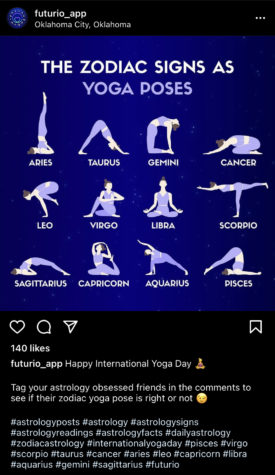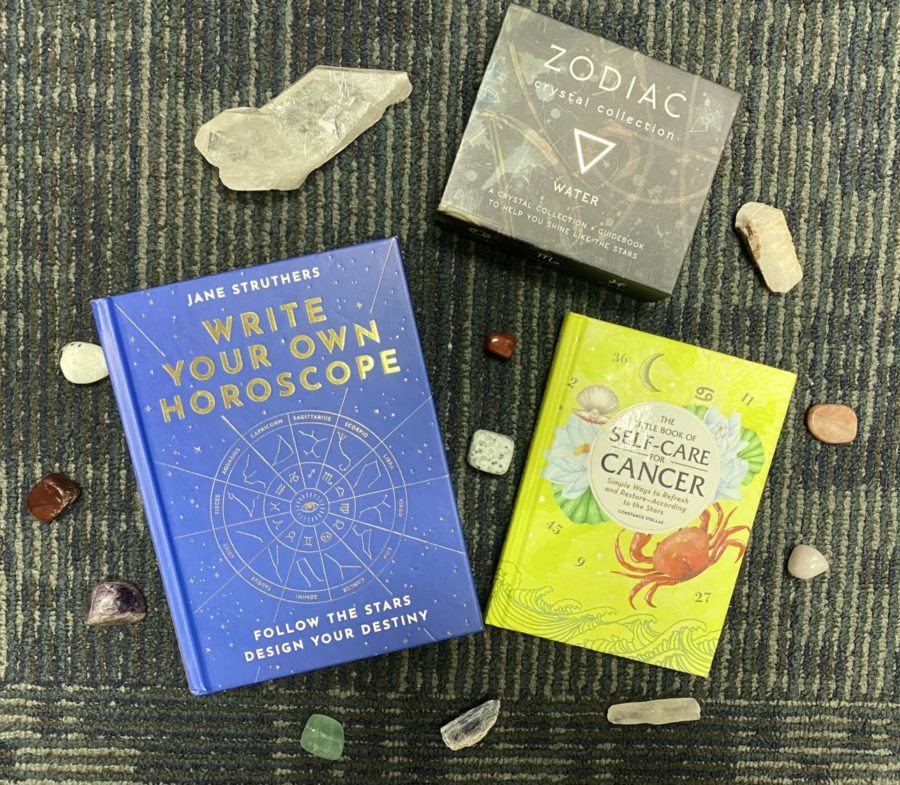Opinion: Astrology is a Valid Belief System
Astrology books and crystals lay scattered around staff writer Eri Leong’s room, as they’ve grown to be pieces of her belief in astrology.
“Is Mercury still in Gatorade?” “You really think the stars control your life?” These sneering, condescending remarks are just a sample of what I hear when I bring up my fascination with astrology.
Astrology extends deeper than the daily horoscope in the newspaper or the generic stereotypes about someone’s character solely based on their birthday. It is a valid belief system that when exercised correctly, takes months to years of learning to effectively grasp. Since astrology is rarely granted that amount of immersion or exploration by the masses, it’s misunderstood, and consequently bashed and disrespected unnecessarily.
Those who believe in astrology should be allowed to talk about constellations, planet revolutions, and moon phases in peace, just as much as the others are granted the freedom to practice and speak on their beliefs as well.
Part of the reason people are often distasteful of astrology is because most of the public is only familiar with what’s referred to by the astrology community as “sun sign astrology,” the oversimplified version commonly found all over social media. Sun sign astrology is miles off in accuracy from the in-depth cosmic calculations that are associated with the centuries-old practice.
Despite astrology being typically blown off and disregarded as a joke, the father of analytical psychology and Swiss psychiatrist Carl Gustav Jung actually dedicated decades of research to it.
In a letter to world-renowned astrologer B.V. Raman in 1947, he said, “In cases of difficult psychological diagnosis I usually get a horoscope in order to have a further point of view from an entirely different angle. I must say that I very often found that the astrological data elucidated certain points which I otherwise would have been unable to understand.”
Growing up as mainly agnostic, I rarely considered having a belief system. Religion to me was always something I looked at as whatever helps people sleep at night, meaning a source of comfort and guidance when faced with the ins and outs of existence. It never governed my way of thinking, bore influence in my life decisions, or held a place in my identity. I’ve always believed the universe contained higher powers than humanity but never cared to identify any of it in the form of personifications like many religions do.
While I never cared to align myself with any designated faith or belief system, astrology began to attract my attention in my senior year of high school in 2018. Like many who choose to lean on religion in whatever form is appealing to them, a common reason for doing so is in times of turmoil, and I was no different. As I began to read more and more astrology forecasts about my day or my week or my month at large, sometimes there were predictions that felt eerily accurate and intimately personal to the experiences I was having.

Once I learned more about the process of astrology, it was different from the perception or reputation it has on many social media platforms. For example, many astrology memes on Instagram associate one minuscule sliver of existence with someone’s zodiac sign, and if people don’t resonate with it, they immediately denounce the credibility of astrology as a whole. This trend plays into sun sign astrology, in which only a person’s sun sign is considered and the rest of their placements are ignored. A sun sign is the zodiac sign that everyone associates with the month they were born and is typically the only sign they know.
Sun sign astrology fails to account for all the dozens of other placements and signs and angles in a person’s birth chart, which is a map of all major celestial objects in the sky at the exact time a person is born down to the minute. In astrology the birth chart is utilized to make predictions about the development of a person’s life in various forms like personality, values, communication style, emotional approach, and more.
Now four years into my interest in astrology, I explain the ideologies of it to all my friends passionately whenever I’m given the chance. Despite my devotion for it, I refrain from letting it dictate my life and what I do. This is a common misconception about people into astrology. As a practice meant for self-understanding and reflection, I use it to guide my decisions and understand my responses to external factors rather than rely on them to determine my fate.
As I became increasingly outspoken in my fervor for exploring astrology, I was commonly met with criticism and disdain. Condescension and contempt filled the voices of some of my peers, and it was constantly brought to my attention that there’s no physical evidence or proof of it.
There’s no physical evidence of any religion. It’s all similar values and practices under different filters.
While Christians or Muslims pray, those who believe in astrology might refer to it as manifestation instead. Whereas Christians and Catholics have rosaries or crosses to focus spiritual energies, astrology followers may use crystals.
Regardless of what faith is being practiced, there’s always the choice to cherry pick which ideologies are adopted and integrated into everyday life, and astrology is no different. No one hangs on every single word in their respective religious texts — it’s always a personal preference.
Spirituality is such an individualized relationship with oneself, that everyone is going to hold a different and unique perspective about how they exist within this universe. The beliefs of one person holds no impact on their neighbor, which essentially means it’s not their business if their faith of choice conflicts.
Pseudo-science, witchcraft, B.S. or not, astrology believers should be able to gush about their placements and planetary transits free of derision.
